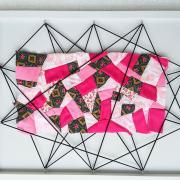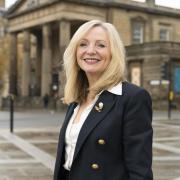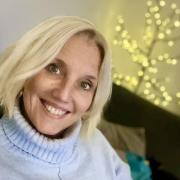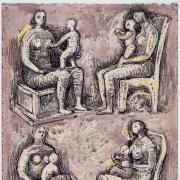It's no easy job following Sir Alan Ayckbourn as the new artistic director of Scarborough's Stephen Joseph Theatre. But Chris Monks is all set for the challenge, says Tony Greenway PHOTOGRAPHS BY JOAN RUSSELL
Sir Alan Ayckbourn - like Elvis - has left the building. After 37 years as artistic director of Scarborough's Stephen Joseph Theatre, one of the most prestigious stage venues in Britain, Sir Alan has decided to call it a day. Ill-health has forced his decision somewhat (he suffered a stroke in 2006) but, at his age, he admits he no longer wants the day-to-day stress of running a theatre (he's still writing and directing, mind you).
So enter stage right Chris Monks, theatre writer, director and composer. On one hand, Chris has a tough act to follow taking over from Alan Ayckbourn who has produced 72 plays (and counting), has a shelf-full of awards, enjoys worldwide acclaim,West End and Broadway success, and is one of the most performed playwrights in the English language.
If Chris is nervous, however, he isn't showing it. 'Alan was someone who inspired me,' he says. 'To find myself sitting in what used to be Alan's office... well, that's a privilege. I can't think of anyone I'd rather follow.'
But Ayckbourn's shoes are big ones to fill. Aren't they? 'Everyone says that,' says Chris. 'But I think any new artistic director has that problem. People expect you to change things, but they don't want you to throw away the good stuff.Well, I don't either. My ego isn't big enough to do that. I want to take the best of what we have here, introduce some ideas of my own and make it better.'
'The SJT without Alan is unthinkable to me, so we will be putting on revivals of his work and I've commissioned him to write a new play. I hope his relationship will continue with the SJT.'
It's not easy, of course, and Chris had only been at the theatre for a week when he had a sobering experience. 'I got in a taxi and asked the cabbie: "Have you ever been to our theatre?" He said: "Last time I was in there, I went to see Herbie Rides Again." He was talking about when the building used to be the Odeon cinema. He told me he went to the Futurist occasionally to see rock 'n' roll shows, but when I asked why he didn't come to the SJT, he just said: "There's nowt on I want to see." That's the sort of challenge I have.'
Chris points out that he was appointed by the board of the SJT to change things. 'But that change is going to happen gradually, because I'm not coming in with a wrecking ball to destroy what has been built up here over the last 50 years. Crucial to the SJT's history is Alan's work, both as a writer and director. The SJT without Alan is unthinkable to me, so we will be putting on revivals of his work and I've commissioned him to write a new play. I hope his relationship will continue with the SJT.'
Funny Chris should say that though.When I spoke to Sir Alan late last year, he wasn't presuming anything. He revealed that he had had a 'nice, friendly meeting with Chris' but told us - modestly, perhaps - that he wondered if Monks 'would countenance any of my work in the theatre'.
'Perhaps if someone else had taken over, they might have had different ideas,' says Chris. 'Nothing goes without saying because, to continue, theatre has to change and adapt. That's what Alan did when he was a younger man. He ripped up the rulebook and said: "Our theatre is going to take place in-theround." Before him, Stephen Joseph had ripped up the rulebook by choosing to make revolutionary theatre in Scarborough, not London.'
When he was seven, Sheffield-born Chris went to the old Sheffield Playhouse with his mum and was blown away by what he saw.His career path was set.
'I'm a Yorkshireman in charge of the SJT,' he practically shouts. 'And that's a first! You can also mention that I'm sad enough to support Sheffield Wednesday, if you like.'
Chris learned his craft at the Royal Exchange in Manchester and was bewitched by the in-the-round theatre environment. Like Ayckbourn, he has had stage manager roles and has acted too. He's also worked for The New Vic, The Orange Tree Theatre and the Bolton Octagon; his directing career has included productions for D'O'yly Carte Opera, The Belgrade and Salisbury Playhouse; and he has written many productions for the stage.
One of his most recent opera productions, Don Giovanni (2008), completes a trilogy of Mozart adaptations, alongside The Magic Flute (1999) and The Marriage of Figaro (2002). 'I never made a career decision,' says Chris. 'Things just happened. I always wanted to direct but never had the confidence. I thought: "That's the sort of thing that people like Alan Ayckbourn do." But I had a go and realised that I could get performances out of actors and inspire technicians with my vision of the piece.'
During the 1980s, Chris wrote the songs for Trafford Tanzi (for Contact Theatre, Manchester) and was musical director on Lennon (for the Everyman, Liverpool). Tanzi eventually took Chris to New York, where he worked with Debbie Harry, of Blondie fame, and the late surrealist US comic Andy Kaufman, the mercurial star of Taxi and the subject of the Jim Carrey movie,Man on the Moon. 'I thought there was something strange about Andy at the time,' says Chris. 'He was an immense talent, but he had this thing about wrestling with women which was a bit odd. It was a fantastic time for me, if a bit surreal.' Surreal?
'Yes,' says Chris. 'For example, I went to Debbie Harry's house and she cooked me my tea.' Chris has, of course, had to move to Scarborough to take up his new post. 'There's just me and my partner, Jan, who's an actress - and my mum who's in her eighties. She's really chuffed to be here because when I was a kid we'd come on holidays to this part of the coast: Bridlington, Filey, and my cousin has a place in Whitby. I'm familiar with the area and one of my real loves is walking. Getting out onto the Moors is a creative inspiration for me.'
So Chris Monks is in the right place but he hasn't got much time for relaxing now.When we speak, he's auditioning for the SJT's summer season of three plays - including the one written by Ayckbourn. He is now shaping the programme and getting to grips with running the company. You can get the mix wrong quite quickly: put on a Samuel Beckett season or a Strindberg play, for instance, and you'll decimate your audience. But you can't simply have crowdpleasers on all the time - can you? 'You can have both,' says Chris.
'You have to listen to your audience and understand what they want. People are already writing to me, asking for a bit more of this or a bit more of that, and seeing the opportunity of a change in the guard. And that's what they should be doing. Everybody pays for the SJT through their taxes, after all.'
If Chris has a message for everyone, though - even people who think they won't like theatre - it must be this: Give it a try. 'I loathe an empty seat,' he says. 'I can't bear it. I have to have a full house. If I don't have a full house, I'm not a happy man.'


























